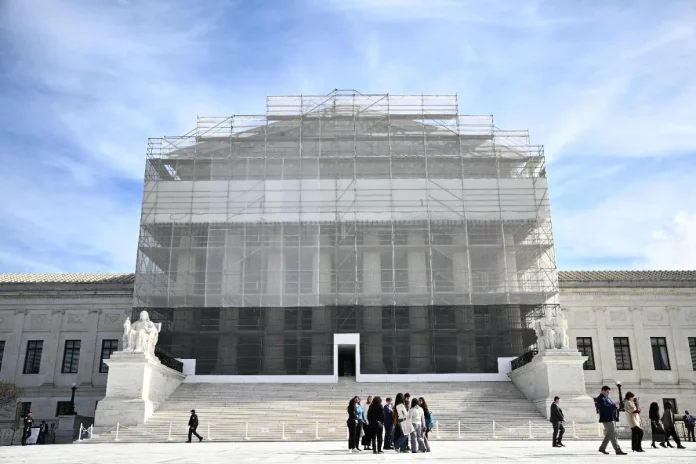The US Supreme Court weighs the legality of Trump’s global tariffs, with billions in revenue and presidential emergency powers at stake.
WASHINGTON: The US Supreme Court will hear arguments Wednesday on whether Donald Trump’s broad tariff impositions are lawful.
This landmark case could either uphold or dismantle a central component of the president’s economic agenda.
Billions in customs revenue and a key tool in Trump’s trade wars now hang in the balance.
The conservative-majority court again confronts a novel test of presidential authority.
Trump has called the case “one of the most important” in US history.
“This case is, literally, LIFE OR DEATH for our Country,” he posted on Truth Social.
Justices will examine Trump’s use of emergency powers for “reciprocal” tariffs on nearly all trade partners.
They will also review levies targeting Mexico, Canada and China over alleged drug flow roles.
Opponents argue such sweeping tariffs violate the International Emergency Economic Powers Act.
The court’s eventual ruling, expected in months, excludes sector-specific tariffs on steel, aluminum and automobiles.
Trump has raised the average effective tariff rate to its highest level since the 1930s.
A lower court ruled in May that Trump exceeded his authority with his global duties.
An appeals court affirmed that decision, prompting Trump’s Supreme Court appeal.
“If a President was not able to quickly and nimbly use the power of Tariffs, we would be defenseless,” Trump argued.
Treasury Secretary Scott Bessent plans to attend the hearing for a “ringside seat.”
White House Press Secretary Karoline Leavitt expressed confidence in their legal arguments.
The administration argues the IEEPA lets the president “regulate” trade by setting import tax rates unilaterally.
Challengers note the statute lacks the words “tariff” or “tax,” while the Constitution grants Congress levy-setting power.
Around 40 legal briefs from businesses, lawmakers and former officials oppose the global tariffs.
Only a few briefs have supported the president’s actions.
Companies, especially small firms, say they bear higher import costs despite no widespread inflation.
Opponents argue trade deficits don’t meet the IEEPA’s “unusual and extraordinary threat” requirement.
Trump’s lawyers counter that longstanding issues can reach a “tipping point” requiring emergency action.
If the court rules against Trump, the government could use other laws for temporary tariffs.
Countries with existing tariff deals may prefer not to reopen negotiations. – AFP








